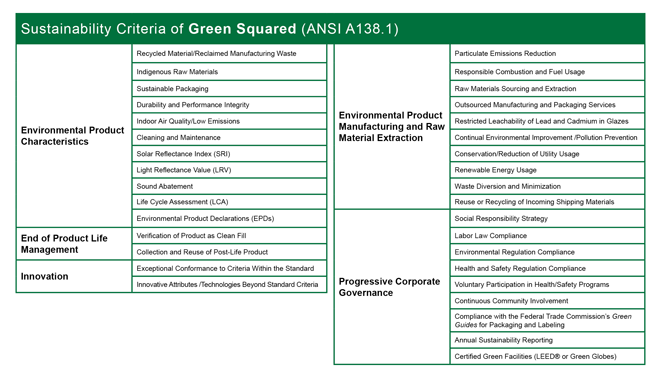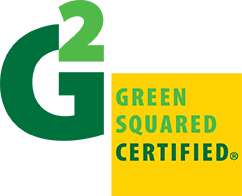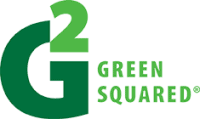Frequently Asked Questions
Green Squared is North America's first and only sustainable product program written exclusively for tiles and tile installation materials. Green Squared involves the sustainable product standard ANSI A138.1 and 3rd party certification to that standard. As such, it is the industry's new go-to mechanism and clear benchmark for defining and acknowledging tile products which are truly sustainable.
With Green Squared, architects, specifiers, and consumers can choose products knowing that their sustainability needs are being met. It serves as the North American industry's unified and consistent interpretation of how to validate product sustainability. With the easily-recognizable Green Squared Certified mark, end users can rest assured that certified product meet the industry's broad range of sustainability criteria.
The standard on which Green Squared is based is ANSI A138.1 American National Standard Specifications for Sustainable Ceramic Tiles, Glass Tiles, and Tile Installation Materials. Like other ANSI standards, A138.1 is a voluntary standard written and approved by an ANSI Accredited Standards Committee (ASC A108) which represents a diverse range of stakeholders. The ASC A108 stakeholders include green building community leaders, tile consumers, manufacturers, distributors, installers, and several others.
Green Squared certification was developed to acknowledge products which have been verified by an independent 3rd party to be in conformance with ANSI A138.1. Products certified under Green Squared are allowed use of the Green Squared Certified mark. This provides architects, designers, and end users with a simple, industry-recognized mechanism for identifying sustainable products.
The Green Squared standard, ANSI A138.1, is applicable to most products which are used in tiling systems. This makes possible the specification and installation of systems of products which meet a common host of sustainability criteria. The following products are within the scope of the standard and are eligible for Green Squared certification if they conform to the ANSI A138.1 criteria:
- Ceramic Tiles and Glass Tiles
- Porcelain, Pressed Floor, Quarry, Mosaic, and Glazed Wall Tiles
- Cast Glass, Fused Glass, and Low Temperature-Coated Glass Tiles
- Dry Powder Installation Materials
- Cement-Based Mortar and Grouts, etc.
- Liquid and Paste Installation Materials
- Mastic and Epoxy Adhesives, Epoxy Grouts, Pourable and Trowelable Membranes, Liquid Latex Additives, etc.
- Panel Installation Materials
- Backer Boards, Panel Underlayments, etc
- Sheet Installation Materials
- Crack Isolation Membranes, Rolled Sheet Underlayments, etc.
Green Squared certification and the ANSI A138.1 standard were developed specifically to be applicable to products no matter where in the world they are produced. A North American program developed to meet the sustainability needs of the North American marketplace, Green Squared provides all producers, foreign and domestic, with a clear benchmark for designing sustainable products which can be accepted by North American green building programs.
The Green Squared standard, ANSI A138.1, takes a multi-attribute approach towards sustainability, establishing criteria which address both environmental and social issues. These criteria, which are specific to the tile industry, are relevant for products throughout their entire life cycle and are in accordance with the North American green building industry's practices, expectations, and leading initiatives. The criteria are spread across five sections:
Here's a chart to illustrate:

- General Environmental Characteristics (product characteristics)
- Environmental Product Manufacturing (including raw material extraction)
- End of Product Life Management
- Progressive Corporate Governance (associated with the product)
- Innovation
Here's a chart to illustrate:

The Green Squared program criteria and all associated logos are owned and managed by TCNA. It was developed in accordance with ISO Type 1 Environmental labeling and declaration requirements (ISO 14024). All certification work is performed by independent third party certification bodies. A manufacturer is free to choose any certification body to certify their product, but only certification bodies which are approved by TCNA are allowed to issue Green Squared certification. Currently, the participating certification bodies include:
Both of these organizations are highly regarded in the North American architectural marketplace and has operations worldwide. Other certification bodies wishing to participate in the program must apply to TCNA. In order for a certification body to be an approved Green Squared certifier, it must operate pursuant to ISO/IEC Guide 65 and meet other criteria which are defined in TCNA's license agreement for certification bodies.
With Green Squared structured the way it is, the industry is provided with a single, well managed and widely acknowledged program under which a variety of certification bodies can operate in accordance with the same rules and interpretation strategies for determining conformance to ANSI A138.1.
- Underwriter Laboratories (UL) Environment
- Scientific Certification Systems (SCS)
Both of these organizations are highly regarded in the North American architectural marketplace and has operations worldwide. Other certification bodies wishing to participate in the program must apply to TCNA. In order for a certification body to be an approved Green Squared certifier, it must operate pursuant to ISO/IEC Guide 65 and meet other criteria which are defined in TCNA's license agreement for certification bodies.
With Green Squared structured the way it is, the industry is provided with a single, well managed and widely acknowledged program under which a variety of certification bodies can operate in accordance with the same rules and interpretation strategies for determining conformance to ANSI A138.1.
A manufacturer seeking to use the Green Squared Certified mark on their product applies directly to a certification body which is approved under the Green Squared program. The certification body then makes necessary arrangements with the manufacturer to evaluate whether or not the product meets the ANSI A138.1 standard. This evaluation, which is in accordance with the Green Squared Certification Program Criteria, includes a comprehensive and objective review of the product and its associated organization and manufacturing facility. Based on this evaluation, if the certification body decides to certify that the product meets ANSI A138.1, the certification body authorizes the use of the Green Squared Certified mark.
Only products which have been verified by an authorized certification body to be in conformance with ANSI A138.1 are allowed to use the Green Squared Certified mark. The mark is used directly on certified products, on product packing or cartons belonging to certified products, or on promotional literature published about a certified product. The mark can only be used in conjunction with certified products, not other non-certified products even if produced by the same manufacturer, and can only be used within a products valid certification time period.
A manufacturer can choose to use either a color or plain black version of the Green Squared Certified mark. Additionally, the manufacturer may choose to include with the mark an identification of the independent certification body which performed the certification.
A manufacturer can choose to use either a color or plain black version of the Green Squared Certified mark. Additionally, the manufacturer may choose to include with the mark an identification of the independent certification body which performed the certification.
Green Squared incorporates a full complex range of sustainability issues into one industry standard and one industry mark. This allows for easy marketplace recognition of tiles and tile installation materials which are the most sustainable.
- Green Squared facilitates the technical specification of sustainable tiles and installation materials.
- As the tile industry's very own sustainable product certification program, Green Squared enables an increased level of consistency in green marketing.
- Green Squared certification provides a smooth, clear, and responsible opportunity for having a product included in a green building project. Additionally, there is a high level of credibility associated with products which are Green Squared certified as they have undergone true third party evaluation by reputable certification bodies.
- Green Squared is recognized by North America’s leading green building standards and certification programs, including LEED, Green Globes, ASHRAE 189.1, International Green Construction Code, and NAHB’s National Green Building Standard.
Green Squared is recognized under LEED Pilot Credit, "Certified Multi-Attribute Products and Materials." This credit awards one LEED point to a project if a certain percentage of building products are certified to meet their relevant industry sustainability standards. With Green Squared listed in LEED as the appropriate standard/certification program for the tile industry, use of Green Squared Certified tile and installation materials can contribute toward earning the point. Click here to review the technical provisions of this credit.
For government building projects the General Services Administration (GSA) now requires that its employees comply with the GSA Green Purchasing Plan (GPP) when selecting building products. GSA employees rely on industry sustainability standards for direction on which products to choose. Many of these standards, including ANSI A138.1/Green Squared, are referenced in the GSA's Performance Based P100 Program – Facilities Standards for the Public Buildings Service.
Additionally, the US Environmental Protection Agency recommends that all federal purchasers use Green Squared to assist in the identification and procurement of environmentally sustainable tiles and related installation materials.
Additionally, the US Environmental Protection Agency recommends that all federal purchasers use Green Squared to assist in the identification and procurement of environmentally sustainable tiles and related installation materials.

